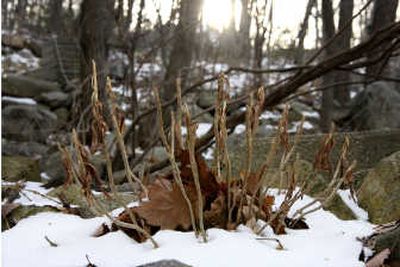Dormant oil combats overwintering enemies

Under all this snow, the overwintering insects and diseases are enjoying a fairly mild winter. They’re asleep under that nice insulated blanket without even a serious cold temperature to interrupt the interlude. That means when the thaw comes they will be back in business.
A timely application of dormant oil could change that.
The term “dormant oil” however is now considered out of date by most pesticide experts who prefer to call it horticultural oil. This is because modern oils are much more highly refined petroleum and vegetable oils than your father or grandfather used. Unlike the old dormant oils that could be used only when plants were dormant, modern oils have less potential to damage plants and can be used for longer periods during the growing season with proper precautions. We will deal with winter applications in this article.
Oil and water
When horticultural oils are mixed with water and sprayed on the appropriate plant, they coat the overwintering insects and eggs with a film of oil that plugs up breathing tubes on their shells. This basically suffocates them. The oil then evaporates leaving no residue. Because this is a mechanical process and not a chemical one, there is very little potential for environmental impact or the development of resistance to the oil. Few beneficial insects are affected by it.
Get the bugs out
Some of the most common insects that are affected by a winter application of horticultural oil include most but not all scales, mites and aphids. Horticultural oils also can reduce powdery mildew and some of the viruses that are carried by the insects.
Often horticultural oils are mixed with copper which acts as a fungicide and broadens the usefulness of the application. This is particularly effective on peach leaf curl. Be aware that lime sulfur sprays, another good fungicide and insecticide must be applied at least two weeks before applying a horticultural oil to prevent damage to the plants.
Read the label carefully before you spray. Horticultural oils can burn emerging foliage if applied incorrectly. Walnuts, redbuds and maples are sensitive to the oil and should not be sprayed at all. Conifers with bluish needles, like Colorado blue spruce, will irreversibly lose their bluish color if sprayed because the oil breaks down the wax coating that creates the color.
Applications need to be done while the buds on the plants are still very tight and haven’t swelled. Spraying when they are breaking and putting out new growth can damage the plants. In the Inland Northwest that usually means spraying needs to be done in early to mid March.
Spray to win
The oil needs to be applied on a calm day when the temperatures are expected to stay above 40 degrees warm enough for the oil to evaporate. Avoid applying it when the night temperatures are expected to drop below freezing. Because the spray is a contact killer, plants must be sprayed thoroughly so that the spray gets into all the cracks and crevices of the bark and small branches.